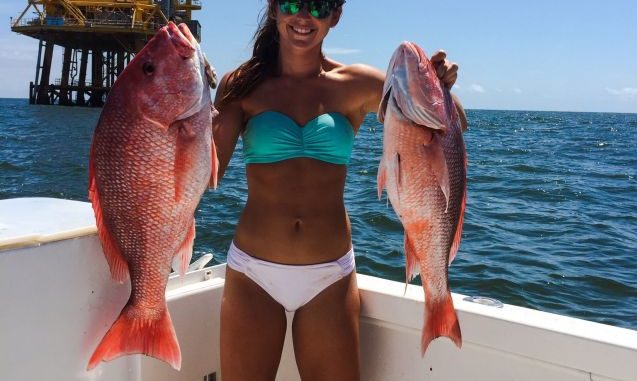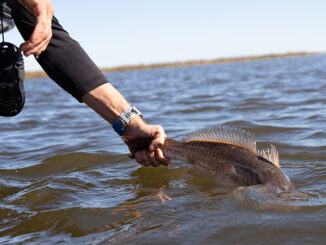
LWF Commission hears red snapper management cost analysis
If red snapper management is ultimately turned over to the individual Gulf states through Garret Graves’ bill currently moving through Congress, the program would come with a $10,039,000 price tag for the Louisiana Department of Wildlife and Fisheries in its first year, according to the state’s head fisheries biologist.
The cost estimate was unveiled in Baton Rouge by LDWF Assistant Secretary of the Office of Fisheries Patrick Banks at Thursday’s four-hour meeting of the Louisiana Wildlife and Fisheries Commission, where charter fishermen spoke out against the legislation and members of Coastal Conservation Association Louisiana voiced their support for the bill.
The commission took no action on the red snapper presentation or the cost analysis.
“We had a Gulf Council meeting break out,” David Cresson, executive director for CCA Louisiana, said after the meeting. “It was a bit surprising to see representatives from Texas and Florida — representatives of historically anti-recreational groups — show up to give their opinions.
“So it felt a lot like a Gulf Council meeting today. And all the arguments they made sounded just like at the Gulf Council every time.”
The red snapper controversy kicked into high gear a few weeks ago when LDWF Secretary Charlie Melancon spoke out against Graves’ bill — H.R. 3094 — due to funding concerns when federal money was stripped from the legislation last month.
“Without federal funding, Louisiana could potentially lack the proper resources to manage the red snapper fishery,” Melancon said in the statement, which was prepared in response to a Texas reporter’s written question and which appeared on undated state letterhead under the names of both Melancon and Gov. John Bel Edwards. “H.R. 3094 would not be a viable option for the Louisiana Department of Wildlife and Fisheries. It would be fiscally irresponsible for the Department to support any mandate that would result in an unknown amount of fiscal burden placed on the State of Louisiana for the management of a single species of fish.
“As a Department, we are charged with managing our fisheries resources for optimum yield; the same applies to our fiscal resources.”
That statement caught many by surprise, including CCA Louisiana, Graves and the Commission — which had just voted unanimously in April in support of regional red snapper management.
Recreational anglers — who got an 11-day federal snapper season in the Gulf this month — have long complained the federal system is highly-politicized, mismanaged and favors commercial fishermen. The prior LDWF administration had worked for years to strip management from the Gulf Council, and worked closely with Graves as the bill made its way through the Congressional process.
“We continue to be disappointed that the department chose to express opposition to Garret’s bill the way they did. But we have committed to work with the governor and the department to work through those issues and get to the point where we can move forward with them on board with H.R. 3094,” Cresson said after the meeting. “The bottom line is we have been down this road before trusting the federal government and the Gulf Council to give us solutions, and it is a dead end…
“We’ve been frustrated by this for years and years, and we finally have a bipartisan, scientifically-supported, well-intentioned bill that has gained momentum in Congress, and sort of unexpectedly the author’s home state is the one that has expressed concern.”
Melancon told the commission his concerns came about because the department will be on the hook to fund and manage the red snapper fishery for Louisiana if the bill becomes law.
According to Banks, the department estimates the first year of the program would cost $10,039,000, including $1,800,000 for fisheries dependent data (LA. Creel), $6,444,000 for fisheries independent data (stock assessments and shrimp trawl by-catch studies), $394,000 for data management, $312,000 for a stock assessment team and $57,000 for administrative support. That brings the biological total to $9,039,000, but doesn’t include the $1million it would take to provide enforcement (which is currently paid for by the federal government) out to 200 miles.
The cost would drop in the second, third and fourth years of the program, Banks said.
“Those costs would be lower,” he said. “We anticipate having to do a stock assessment every five years at a bare minimum, so a large portion of the fisheries independent data would not have to be done in those interim years.”
Melancon told the Commission the move to strip federal funding from Graves’ bill last month was a “poison pill” amendment.
“What I see for Mr. Graves’ bill — and I served in Congress and I know what the actions are — I can tell you when a committee chairman takes the funding out of the bill, it is a killer amendment,” Melancon said. “It’s not intended to be a friendly amendment.”
The secretary reiterated that he was in favor of regional snapper management, but that it was fiscally prudent with the state’s current budget concerns to speak up.
“Do I want, and does this department want, more fish for the creel and more days to fish? The answer is absolutely and emphatically yes, and it has been since the day I got here,” Melancon said. “’If we were flush with money, we could maybe find it. But if I’ve got to find money within this department, then who do I take it from? The shrimpers? The crabbers? How about the duck people or the deer people? I’m going to have to rob a pot somewhere to get the money.”
Cresson disagreed with Melancon’s assessment of the “poison pill” amendment on Graves’ legislation, and questioned the $10 million-plus price tag unveiled on Thursday.
“Garret is moving full speed ahead with the bill. He’s gotten reaffirmations from several Gulf states since Louisiana’s opposition came out — and that’s regardless of the funding issue,” Cresson said. “It’s got very strong support, and we hope Louisiana can be a part of that number sooner rather than later.
“The bottom line is it’s an important enough issue that we should be working through those issues instead of letting them become a blockade to progress.”
Banks, who now sits on the Gulf Council, told the Commission he worked to get an amendment passed at their meeting last month in Florida that will create an ad hoc committee to study regional snapper management for the private recreational community.
“The other state directors told me I was being naive,” Banks said. “But all I’ve heard at the two council meetings that I’ve been there for is this council can do nothing. We can get nothing accomplished. Everyone was frustrated, but nobody wanted to stand up and do anything.
“This I felt moved us down the road. If we’re just going to sit there and not take a step forward because we don’t believe we can walk, well then we’ll never try.”
Cresson, for his part, is convinced the Gulf Council is not the way to go to address red snapper management.
“The ad hoc committee was approved and I think they’re populating it as we speak. And I guess a lot will depend on how that’s done. But if they populate it according to the original outline, it’s going to be the same as the council overall,” Cresson said. “And as we’ve seen, even if the ad hoc committee were to come up with great recommendations, if they don’t fit the overall desires of the Gulf Council in general, they’re not going to pass.
“So it’s a frustrating system. The ad hoc committee on paper sounds great, but we’ve heard this story too many times.”


